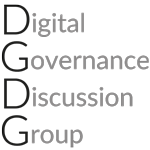By Peixi Xu.
Despite the removal of considerable parts of contents which are regarded as controversial in the second version of the Global Digital Compact (GDC), the third version of GDC is now being challenged by member states who chose to break the silence procedure.
However, this moment should not be understood as a setback of this prominent process, but as a moment to recognize the complex, encompassing, evolutionary, and interwoven nature of digital issues, where governance issues as diverse as Internet technical resources, data, online content, and most recently AI, are mixing altogether.
The initial framework about GDC used to describe global digital governance in 7 topics: (1) connectivity, (2) avoiding Internet fragmentation, (3) data protection, (4) applying human rights online, (5) accountability for online content, (6) regulating AI, and (7) digital commons. After rounds of consultations and talks, the third version of GDC now combine and integrate the 7 topics into 5 areas: (1) digital divide, (2) digital economy, (3) human rights, (4) data, and (5) AI. A renegotiation process perhaps will not bring the document back to the 7-topic framework but may be used to enhance some achievements on the one hand and address some disputes on the other. The following is some observations and comments regarding the third version of GDC based on a leaked text online.
Paragraph 27 of the third version of GDC can be further enhanced to uphold a non-fragmentation principle of Internet governance. Paragraph 27 is an achievement already in that it recognizes that Internet governance must remain global in nature, with full involvement of all stakeholders. Countries as diverse as the United States (in the trial of setting up an alliance for the future of the Internet by pinpointing the so-called “traitors” of Internet), Russia (in the statement to set up an interstate internet governance system), and Ukraine (in the request for action on the cc-TLDs of another nation) have once alarmed the global community about a potential technical fragmentation of the Internet.
In this case, paragraph 23 of the beginning part of the EU Cybersecurity Act offers good reference for GDC talks. That paragraph defines the main protocols and infrastructure of the open Internet as a public core and a global public good, and supports “the security of the public core of the open internet and the stability of its functioning, including, but not limited to, key protocols (in particular DNS, BGP, and IPv6), the operation of the domain name system (such as the operation of all top-level domains), and the operation of the root zone”.
Paragraph 30 (b) of the third version can be further enhanced by calling for States to refrain from or stop massive digital surveillance. A “Civil society joint brief on the UN Global Digital Compact” published on July 19 prefers a wording that States should “ensure that targeted surveillance technologies are only used in compliance with international human rights law, including the principles of legality, legitimacy, necessity, and proportionality” .
Paragraph 33 can be enhanced by pinpointing war propaganda and further categorizing online hate speech (national, racial or religious hatred) and call on social media platforms to incorporate them into community rules and content moderation processes. This would mean a rearticulation of the Preamble to the Constitution of UNESCO which states that “since wars begin in the minds of men, it is in the minds of men that the defenses of peace must be constructed” , and a digital application of the Article 20 of the ICCPR (The International Covenant on Civil and Political Rights) .
Paragraph 45 and 46 can be strengthened by replacing the words such as “trust” “trusted” with “privacy safeguards”. Some trust-related vocabularies are abstract and subjective and have been used by States with different implications, often to build smaller coalitions and practice protectionism. A more objective terminology is needed.
Paragraph 50 of the third version has dropped the phrase “in the non-military domain” when talking about AI governance. The same is true in a few other places. The disappearance of such a phrase significantly improves the value of GDC especially about AI governance because the most urgent AI-related risks are from the application of it in the military domain. It is true that GDC is surely more about digital issues and has little to do with military issues. However, there is no need to make such an intentional distinction. That has made GDC more powerful when Paragraph 54 (d) emphasizes “robust human oversight of AI systems in compliance with international law”.
